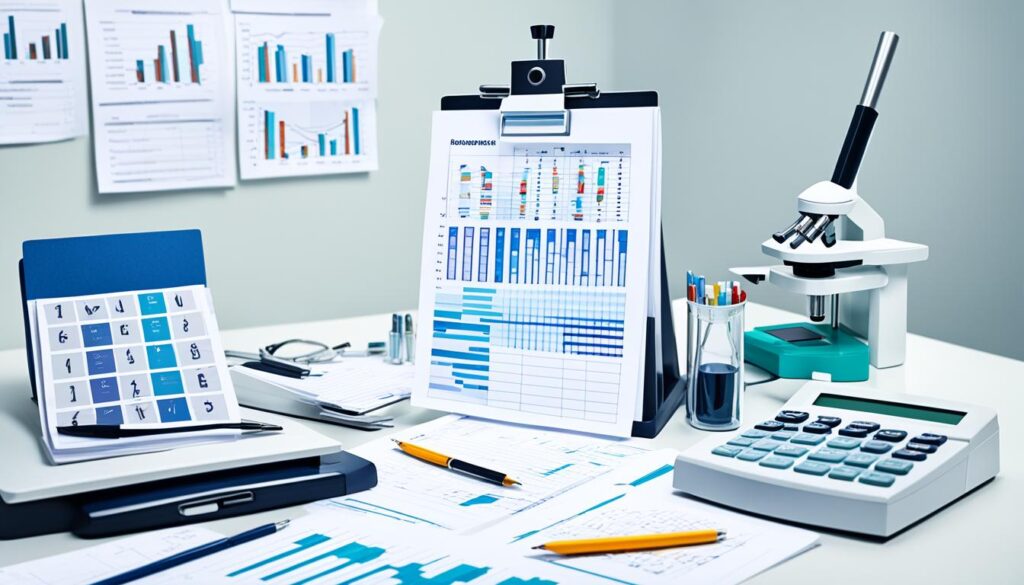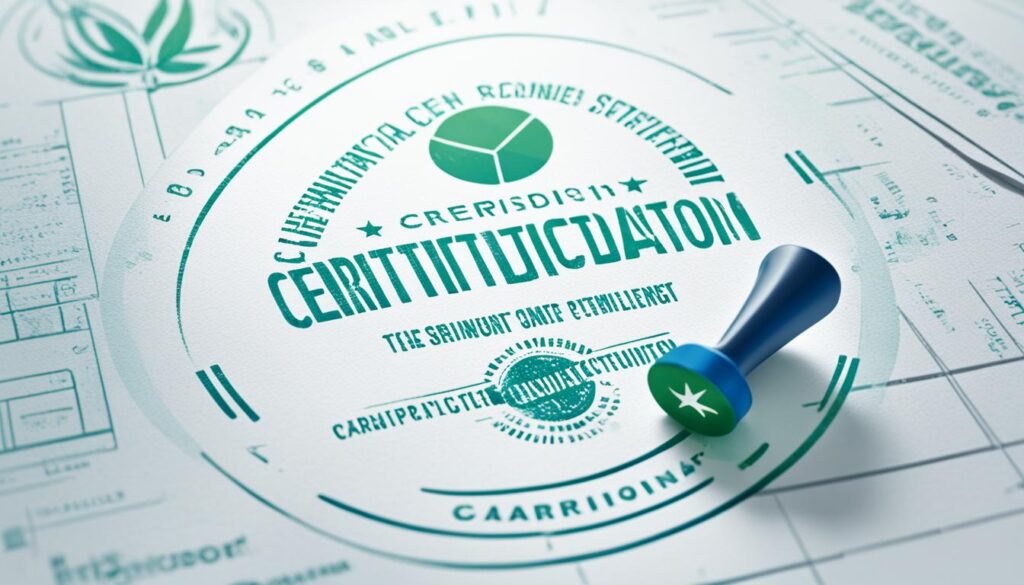Starting a laboratory testing business is an exciting venture in the healthcare industry. With the right approach, you can build a thriving enterprise. This laboratory startup guide will help you get your lab up and running.
First, create a solid lab business plan. This plan will guide your decisions and help secure funding. You’ll need to research market trends, find your target audience, and outline your services. Remember, you must also consider laboratory certification requirements.
Starting a laboratory is not just about science; it’s also about business. You’ll need to pick a great location, buy top-notch equipment, and hire skilled people. Quality control is key to ensure your results are accurate and reliable for your clients.
Key Takeaways
- Develop a comprehensive lab business plan
- Secure necessary certifications and licenses
- Choose a strategic location for your laboratory
- Invest in high-quality equipment and skilled staff
- Implement rigorous quality control measures
- Create a marketing strategy to attract clients
- Stay updated on industry regulations and trends
Understanding the Laboratory Testing Industry
The laboratory testing industry is key to modern healthcare. If you’re thinking about starting a lab testing business, knowing the industry is crucial. It helps you see the big picture and spot opportunities.
Medical Laboratories in Healthcare
Medical labs are essential for diagnosing diseases. They give vital information for tracking treatments and preventing health issues. Your lab will work closely with doctors, helping them make the best health decisions for patients.
Market Trends and Opportunities
The healthcare field is always changing, offering new chances for lab testing businesses. Areas like personalized medicine, genetic testing, and quick diagnostics are on the rise. Keeping up with these trends can help your business thrive in the evolving market.
Types of Laboratory Testing Services
Think about the services your lab will offer when planning. Common services include:
- Clinical chemistry for blood and urine analysis
- Hematology for blood cell examination
- Microbiology for identifying infectious agents
- Immunology for detecting antibodies and antigens
- Molecular diagnostics for genetic testing
Knowing these parts of the lab testing industry will help you craft a strong business plan. It also helps you find your place in the competitive healthcare world.
Developing a Solid Business Plan
A solid business plan is key for success in the testing industry. It acts as a roadmap, guiding your decisions and helping you get funding. Let’s look at the main parts of a strong business plan for your lab testing business.
Conducting Market Research
Begin by researching the lab testing market. Find out where there are gaps in services, what’s new, and where you can specialize. This info will shape your business strategy and make you stand out.
Defining Your Target Audience
Who will use your lab services? Are they healthcare providers, research centers, or consumers? Knowing your audience helps you tailor your services and marketing.

Creating Financial Projections
Make realistic financial plans for your lab testing business. Include costs to start, ongoing expenses, and how much you expect to make. Good projections show you’re a solid investment and help with budgeting.
Outlining Your Marketing Strategy
Explain how you’ll draw in and keep clients. Think about online marketing, networking events, and working with healthcare providers. A good marketing plan is key to growing your lab business.
Remember, your business plan should change as your business grows. Update it often to keep it relevant.
Legal and Regulatory Considerations
Starting a lab testing business means dealing with lots of legal and regulatory stuff. First, you need to get the right licenses and permits from state and federal agencies. Getting CLIA certificates is key for running a clinical lab in the U.S.

You must know the lab certification rules based on the tests you do. Make sure your lab meets all the standards. This might mean buying special equipment, setting up quality control, and hiring skilled people.
Keeping your lab safe is very important for your staff and getting accurate test results. Safety rules should cover things like:
- Proper handling and storage of dangerous materials
- Using personal protective gear
- How to get rid of waste
- Plans for emergencies
Getting your lab accredited by groups like the College of American Pathologists (CAP) boosts your credibility. It shows you’re serious about quality and can make clients and partners trust you more.
Following industry standards and laws is a constant task. Keep up with changes in lab certification and safety rules to keep your business in line with the law.
How to Start a Laboratory Testing Business: Step-by-Step Guide
Starting a laboratory testing business needs careful planning and action. Here are the key steps to launch your venture.
Securing funding and investment
You’ll need money to start your lab. Look into bank loans, grants, or private investors. Make a strong business plan to draw in backers. Starting a DNA testing business can be very profitable today.
Choosing the right location
Find a location that’s easy to get to and fits your needs. Think about size, utilities, and room for growth. A great location is key to your lab’s success.
Acquiring necessary equipment and supplies
Look for trusted suppliers for your lab equipment. Good equipment is key for accurate tests and smooth running. Spend on quality equipment from the start.
Hiring and training qualified staff
Your team is crucial to your lab. Focus on hiring and training skilled people. Find experienced technicians and staff who can help your business grow.
Implementing quality control measures
Put in place strict quality control to ensure reliable results. This is crucial for gaining client trust and keeping high standards. Regular checks and balances will keep your lab efficient and smooth.
FAQ
What are the key steps in starting a laboratory testing business?
Why is a solid business plan crucial for starting a laboratory testing business?
What legal and regulatory considerations should be taken into account when starting a laboratory testing business?
How can I secure funding for my laboratory testing business?
What factors should be considered when choosing a location for a laboratory testing business?
How important are quality control measures in a laboratory testing business?
Author
-

Lucas Martinez is an accomplished entrepreneur with a passion for startups. He has launched and scaled multiple businesses, providing pragmatic advice on starting and growing a business.
View all posts



